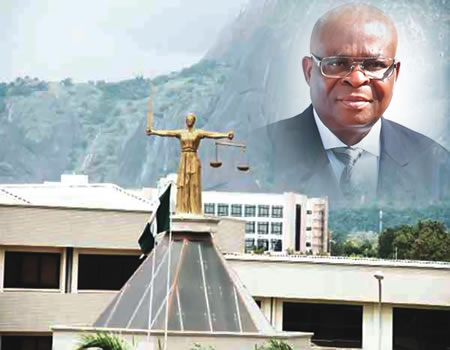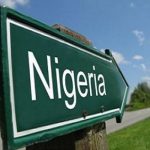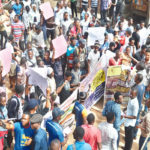LANRE ADEWOLE periscopes the justice sector and the war within.
The Chief Justice of Nigeria, (CJN), Justice Walter Nkanu Sylvester Onnoghen during a recent thanksgiving service in Abuja, to commemorate his ascension as the head of the judiciary arm of government, cried out that the arm of government and by extension, the justice sector, is under siege. Many would agree he succinctly captured what the system has been going through in the last two years of the Muhammadu Buhari administration. Many would however argue that the rumpus in the judiciary today is self-wrought.
Incidentally, the anti-corruption war, which is the signature project of the current administration, should have been mainly driven by the judiciary, with senior lawyers and judges expected to play complementary roles in helping the administration give vent to its desire to make the signature policy a huge success.
Two years down the line, the executive arm which is the main driver of the anti-corruption project, and the judiciary, expected to complement, have practically become “enemies”. Available statistics on the anti-corruption onslaught, will arguably make the judiciary, the most troubled, by the agents of the executive arm, spearheading the anti-corruption crusade.
Onnoghen should know. His headship of the judiciary was almost not be, in the name of anti-corruption. The Buhari government, using mainly the “terror” of the Economic and Financial Crimes Commission (EFCC) and the Department of State Service (DSS), has touched and torched public service spaces hitherto considered sacred and the Nigerian public and world beyond the nation’s shores, is applauding the executive for the “feat”.
In a manner which suggests that the president had worked out the anti-corruption targets, the judiciary and major players in the government of former President Goodluck Jonathan have mainly come under the hammer of both the EFCC and DSS, with Police in recent time, joining in the fray. When the administration set out in 2015, the central anti-corruption focus was “name and shame”, a campaign spearheaded by the Minister of Information and Culture, Lai Mohammed. Even when trials hadn’t begun, corruption suspects who were mainly senior members of the opposition PDP were publicly shamed as looters, a carry-over of the campaign rhetorics when the then ruling party was branded a camp of looters. The administration also made it manifest its desire to recover alleged humongous public fund stolen by yesterday men and women of power. Prosecution of suspects, though not left out, can’t really be said to be a major focus in the anti-corruption fight.
The execution of the desirable project has expectedly drawn it into deep controversy of alleged ethnic smearing, clannish and partisan protection, vengeance, vendetta, nepotism and “unholy” agenda to foist a one-party state on the nation. The president’s corner has however strenuously denied all the allegations. According to his spokespersons, it was only those who have skeletons in their cupboard that should fear, though the assertion may not be completely correct when viewed from two broad templates.
One, only a competent court of law could declare anyone guilty of corruption, so the idea of assuming someone with skeleton would remain conjectural until proven in a court of law. Two, if the suspicion of skeleton in the closet is applied, the administration could be guilty on many fronts, either by association or commission, because many of its front-row leaders have had alleged corruption allegations hanging over them in the last two years without any form of actions from the corruption fighters.
A semblance of such however took place recently when Buhari suspended the Secretary to the Government of the Federation (SGF) Babachir Lawal over alleged corruption and massive abuse of office. Yet, the administration’s critics, including some of its own like the Senate President Bukola Saraki, Senator Shehu Sani, Senator Dino Melaye, among others, have refused to back down, citing Lawal’s case as not only barely enough, but tokenism adopted to give a soft-landing and balance ethnic equation in relation to the suspension of the Director General of the National Intelligence Agency (NIA) over a huge cash of about N13 billion which EFCC unearthed in an apartment on Osborne Tower, Ikoyi, Lagos.
With three groups of judiciary, PDP and senate appearing to be the central focus of the fight, while certain individuals and government operators have been rolled in as collateral damages, with all sides to the conflicts arising from the controversial anti-corruption project coming down with casualties.
Essentially, the project which was viewed as mainly political at inception, has moved from there to what could be called inter-arms of government triangular war, culminating in what could now be dubbed a story of collateral damages.
Fall guys also appear to have been programmed into the triangular war. Institutional reactions to the executive methodology, especially from the National Assembly and the National Judicial Council (NJC) have been termed as corruption fighting back by the executive arm. The accused arms of government are also moving from just kicking verbally to taking actions. After many dog-fight over budget, the National Assembly leadership has also used every available opportunity to pick out the beam in the eye of the executive branch. Apart from tactically shifting the burden of budget padding to some executive arm agents, every semblance of alleged graft within the Buhari confines, has been hoisted as a mark of hypocrisy. At a recent book launch, hosted by Melaye, Saraki described the anti-corruption agenda of his own party and government as a farce.
Professor Itse Sagay, the head of the presidential advisory body on anti-corruption who is gradually emerging as the new face of the onslaught was forced to dub Saraki and his fellow senators “satanic”.
The constant exchange between the National Assembly and those who have taken it upon themselves in Buhari’s corner like Sagay, Kaduna State Governor Nasir el-Rufai, presidential spokesperson Mr. Femi Adesina among others, has come to depict the intensity of the institutional war, with both sides seeking for the understanding and endorsement of the Nigerian populace. So far, the corner of the president is winning.
But the judiciary could not be said to be without trophies against the presidency’s perceived revenge battle. Even before Onnoghen saga, the president’s party had lost all its governorship appeals at the Supreme Court and still losing. Two of such losses, Taraba and Rivers were allegedly so painful to the president that he reportedly decided to do the “needful” once and for all. Then followed the unprecedented midnight raid on judges’ homes. Onnoghen, then the most senior judge in the land, escaped the humiliating raid by a breath of air.
The median of mutual respect can be said to have collapsed since the October 8th and 9th, 2016 incident.
It is also likely a mindset is settling, though the string of losses for the executive arm in the alleged corruption cases charged to various courts including the one involving Justice Adeniyi Ademola, had been widely attributed to lack of diligent prosecution.
However one anti-corruption innovative by Buhari which has won countless hearts to his side, is the whistle-blower policy. It has been rewarding in a way possibly unimaginable for the drivers. Nigerians are leaking and squealing, at the prospect of mega-million commission. Even with the controversy trailing the Ikoyi cash haul involving NIA, nobody has faulted the whistleblowers. The cover provided for potential whistle-blowers also appears cast in iron. Remarkably, fake whistle blowers have also been sanctioned with open trial in court. Apart from the reported delay in commission payment and the question on the place of patriotism by paying whistle-blower, the policy looks good to serve the Buhari administration for as long as the essence can be sustained.
Before the president left for his current medicals, a semblance of rapprochement with the National Assembly leadership seemed to have come to the fore but a collateral damage named Ibrahim Magu remains a sore thumb in the peace deal. The president’s kinsman, Lawan Daura has nailed him twice from assuming duties in full capacity. Only time will tell how the game will play out between Buhari and his Vice.
There is a consensus that all organs of government must work together to deliver on justice reform and the anti-corruption campaign. Justice Onnoghen has begun what is expected to be a major reform in the judiciary but there are many including the executive arm who believe the reformers should be the first to be reformed; hence the hard fist from the executive arm. But the executive arm itself is widely seen as not only selective in its anti-corruption drive but in obedience to court orders, with the most talked-about being the continued detention of Islamic cleric Sheik Ibraheem el-Zakzaky and the immediate past National Security Adviser, Colonel Sambo Dasuki, despite being granted conditional bail. Public commentators are united in calling for a new attitude from the executive; hence the hard tackles from other arms of government. As for the National Assembly, its battles have mainly been against the savaging public opinion which ended forcing it to make its budget open for the first time in the life of this republic.
With everybody obviously needing a reform, including DSS and EFCC, the question is who is clean enough to bell the cat as the Buhari administration begins its journey to the last two years of its mandate.
WATCH TOP VIDEOS FROM NIGERIAN TRIBUNE TV
- Relationship Hangout: Public vs Private Proposals – Which Truly Wins in Love?
- “No” Is a Complete Sentence: Why You Should Stop Feeling Guilty
- Relationship Hangout: Friendship Talk 2025 – How to Be a Good Friend & Big Questions on Friendship
- Police Overpower Armed Robbers in Ibadan After Fierce Struggle







